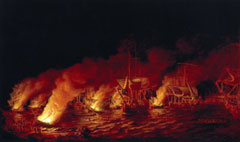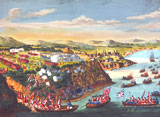|
|
|
|
|
|
|
|
|
The Seven Years' War French-British Rivalry in North America A World War The Seven Years' War
French and British settlements,
1755
(Canadian War Museum, 1.D.1.1-CGR3) 
The Defeat
of the French Fireships attacking the British Fleet at Anchor before
Quebec, 28 June 1759
Painting by Dominic Serres Courtesy of Library and Archives Canada, C-4291 One hundred and fifty years of French-British conflict in North America ended in the Seven Years' War and the British conquest of Canada. The Seven Years' War began when a combined French-First Peoples force expelled British colonists from the Ohio valley in 1754. This local clash quickly escalated into a world war. Beginning in 1755, Britain and France sent thousands of professional soldiers to North America. A year later, hostilities spread to Europe and both nations formally declared war. By 1759, war raged in Africa, Asia, Europe, North America, and the Caribbean, and Quebec was under attack by a British fleet and army. Fighting ended in 1763 when France and Britain signed the Treaty of Paris. The outcome was a crushing British victory that made Great Britain the world's leading colonial power. French-British Rivalry in North AmericaFrance and Britain exported their European rivalry to North America. Even as the French founded Quebec City and fought to survive the Post-Contact Wars, the British established powerful colonies to the south. Caught between two empires, the land and seas from Quebec City to the Bay of Fundy quickly became a theatre of war. Here, the French and British fought for control of harbours and fishing grounds. Harbours became naval, merchant, and fishing ports, administrative and commercial centres. A World WarThe Seven Years' War was the first global conflict. Fighting began in North America and spread around the world. |
|||||||||||||||||||||||||||||||||||||||||||||||||||||||||||||||||||||||||||||||||||||||
